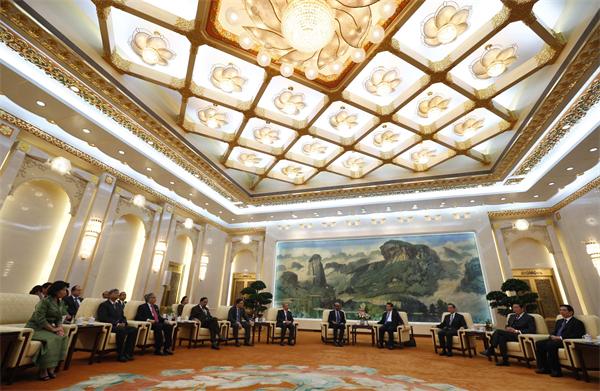 |
|
China's President Xi Jinping (4th R) meets with the guests at the Asian Infrastructure Investment Bank (AIIB) launch ceremony at the Great Hall of the People in Beijing in this October 24, 2014 file photograph. [Photo/Agencies] |
After more than 50 countries and regions joined or applied to join the China-proposed Asian Infrastructure Investment Bank by March 31, the United States changed its attitude toward the bank. From publicly criticizing its allies for joining the AIIB, the US is now emphasizing that the bank should follow the "high standards" set by other global or regional financial institutions such as the World Bank, International Monetary Fund and the Asian Development Bank.
The US hasn't clarified what it means by "high standards", but if people take the US-led World Bank as a reference, it would include the objectives of operation, such as the purpose of the organization, investment fields and management structure. So by referring to the World Bank's "high standards", the US is only trying to create another obstacle for the AIIB.
As far as its purpose and orientation are concerned, the World Bank's initial aim was to help the reconstruction of Europe and Japan after World War II, and support the economic development of African, Asian and Latin American countries. The loans the World Bank offered focused on large-scale infrastructure construction. After the European and Japanese economies recovered, the World Bank focused mainly on the economic development of developing countries. From the 1990s it began offering loans to the Soviet Union, Eastern European countries, and China.
In the early postwar period, the US, as one of the two superpowers, played a dominant role in the world economy. Needless to say, the US excluded the Soviet Union and Eastern European countries from its development scheme.
When postwar national liberation movements resulted in the nationalization of many countries' assets and thus undermined the US-led World Bank's "legal" interests, and some countries such as Iraq publicly challenged the US, Washington assumed that large-scale loans for infrastructure construction to developing countries were benefiting its opponents. So in the intervening years, the World Bank changed its aim to "alleviating poverty". And this policy pushed the new economies with great development potential to the low end of the industrial chain.

I’ve lived in China for quite a considerable time including my graduate school years, travelled and worked in a few cities and still choose my destination taking into consideration the density of smog or PM2.5 particulate matter in the region.